I work part-time in an older university theatre where I frequently encounter relics of bygone eras. One of note: a disused communication system whose handsets survive in parts of the building that have not yet been renovated (pictured below).
To give you an idea how old those are: the Earl Stieler whose name adorns them retired in 1991.1 I am not sure if the handsets still work, as I’ve not had the opportunity to test the system. However, when held to the ear, they produce eerie whispering sounds, as if from a realm of despairing and lost souls. Perhaps I will round up an orphaned, friendless voluntold and see what happens when two handsets are used simultaneously. The results cannot help but be educational!
A quirk of old-timey phones and phone-like devices is that they gave no hint as to who might be calling. It could be your beloved granny. It could be Satan.2 The only way to find out was to listen. Even then, one could not be sure the caller was who they claimed to be…
The Lord of the Rings by J.R.R. Tolkien (1954-55)
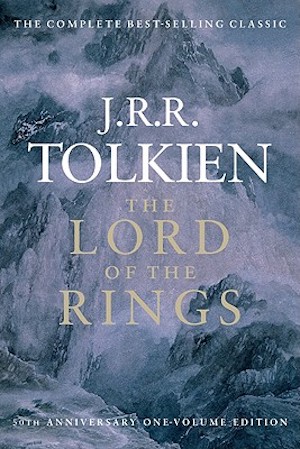
Although the main plot centers around an accessory-based stratagem to confound would-be world-conqueror Sauron, significant subplots center on Middle-earth’s answer to telephones. The Elf-made palantírs permitted communication as well as surveillance over vast distances. In a sense, they fill a niche much like today’s smartphones. They could be a mixed blessing.
There were several problems with the palantírs. They might lead their users to focus on unimportant matters and ignore important events. More sinisterly, Sauron has a palantír. Anyone gazing into a palantír risks encountering Sauron’s corrupting gaze looking back at them.
People using palantírs tend to be ignorant of the dangers or foolishly confident that they can avoid them. This includes Sauron. Sauron doesn’t have to worry about being corrupted by contact with Sauron (or alternatively, can never escape said corruption), but he is just as vulnerable as other users to misinterpreting what he sees on the palantír, with significant implications for the plot.
Sam, This is You by Murray Leinster (Galaxy Maxazine, 1955)
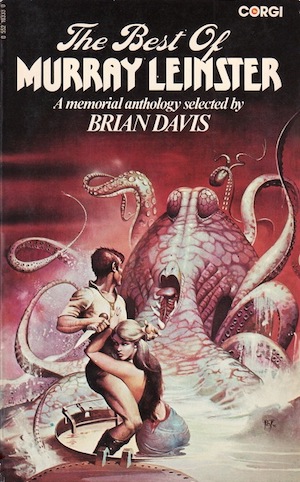
Batesville and Rappahannock Telephone Company linesman Sam Yoder is surprised to receive a call on a line he knows is dead. Sam is even more surprised to hear his own voice on the other end of the line. The tale the other Sam spins is bizarre, but one that promises big benefits to linesman Sam.
The other Sam is calling from ten days into Sam’s future. Armed with what Sam-future tells him, Sam-now can make both of them rich. Knowing as he does how things will play out, Sam-future judiciously conceals certain details from his past self. After all, why worry the poor sap over calamities about which he will learn soon enough?
Modern readers should be aware that Leinster was of his time in his depiction of women characters. Which is to say, often misogynist.
Many characters armed with foreknowledge of the next ten days might be foolishly tempted into intervening in national or international affairs. Sam, on the other hand, keeps his eye on the ball. There were no doubt any number of disasters going on the background that a quick call the authorities could have mitigated. Sam ignores them all. Sam focuses on applications that will make him money and will not invite awkward questions.
“When You Hear the Tone” by Thomas N. Scortia (Galaxy Magazine, 1971)

Having spent eighty years honing his capacity for antisocial irritability, Mark Fleiker is a bitter, lonely old man. Repeated phone calls from a stranger are not welcome. Repeated phone calls from an unfamiliar woman whose conversation makes it clear she is in a different year entirely should be especially unwelcome.
And yet, having spent his entire life alone, companionship now seems a welcome possibility to Mark…provided he can circumvent the decades separating Mark from the mysterious woman on whom he is now fixated.
The title is, of course, a reference to what is now no doubt a long-vanished service in which the phone company could provide the time. Small children desiring to be shouted at by irate parents could easily call this service a dozen times an hour. Ask me how I know.
Good Omens by Terry Pratchett and Neil Gaiman (1990)
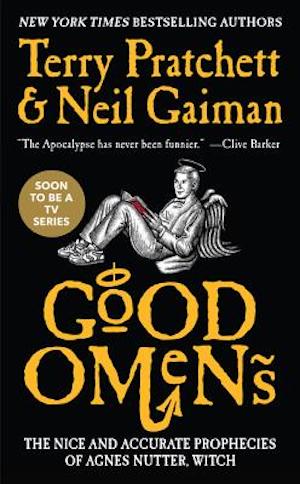
Doomsday is ordained, or so the best (and worse) authorities assert. The demon Crowley and the angel Aziraphale having become fond of Earth, they would prefer the planet and all on it not perish. Therefore, the pair proceed to bollox up the grand plan to bring an end to it all.
At one point, Crowley avoids an uncomfortable conversation with high-ranked demon Hastur by tricking his demonic overseer into a convenient answering machine. It’s a trap that should contain Hastur forever…or until an unlucky telemarketer calls Crowley’s number.
Roughly 95% of all the phone calls I get are from scammers, telemarketers, and their ilk. It is very annoying that a once-useful technology is now only a medium for vexation. Nevertheless, it would probably be wrong to commodify the arrangement Crowley creates with Hastur and the answering machine. But I bet one could make a ton of money selling such a service….
“The Black Phone” by Joe Hill (20th Century Ghosts, 2004)

Kidnapped by the Grabber, Finney is imprisoned in a basement. The basement contains an old phone… but the line is dead and Finney cannot use it to call for help. Or rather, Finney cannot call the mundane authorities.
The Grabber has kidnapped and killed previous victims. Through the black phone, the shades can share what they learned about the Grabber with Finney. If Finney is lucky, and cunning, this might be enough to save him.
Is Finney a reference to famed author Jack Finney? And is anyone else compelled, as I am, to start humming a certain Wobblies-related3 tune when they see Joe Hill’s name?
***
I considered and discarded a dozen possibilities before settling on these five. There are therefore lots of appropriate stories that were not mentioned above, since I do not have the space to mention every possibility! Feel free to make the case for your favourite stories. Comments are below.
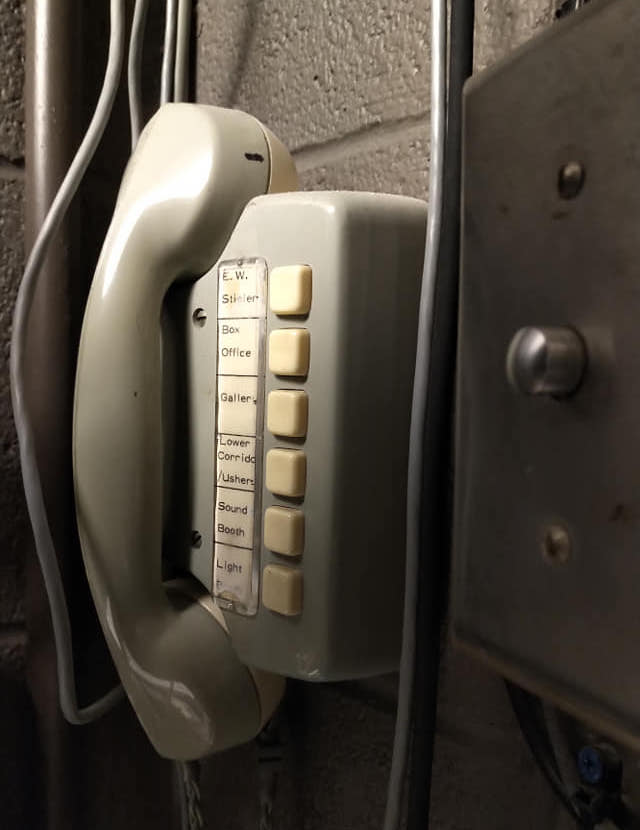
In the words of fanfiction author Musty181, four-time Hugo finalist, prolific book reviewer, and perennial Darwin Award nominee James Davis Nicoll “looks like a default mii with glasses.” His work has appeared in Interzone, Publishers Weekly and Romantic Times as well as on his own websites, James Nicoll Reviews (where he is assisted by editor Karen Lofstrom and web person Adrienne L. Travis) and the 2021, 2022, and 2023 Aurora Award finalist Young People Read Old SFF (where he is assisted by web person Adrienne L. Travis). His Patreon can be found here.
[1]A meaningless coincidence: after I finished the first draft of this, I discovered I wrote it five years to the day after Earl died.
[2]No offense to those of you whose granny *is* Satan.
[3]Unfamiliar with the Wobblies? Encyclopedias are your friend. I used to say search engines were your friend, but thanks to the application of large language models to search engines, search engines are just as likely to be your bitter enemy.
[undefined]undefined










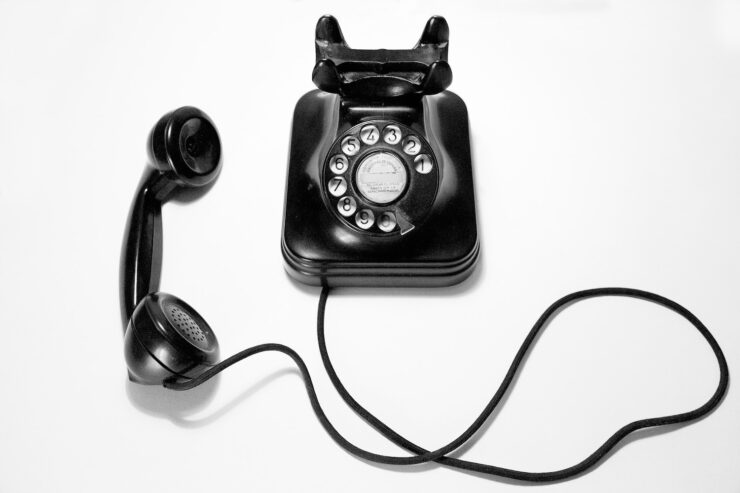
Sorry, Right Number by Joe Hill’s dad springs immediately to mind.
Peter S. Beagle’s short story “Kaskia” has a lonely man chatting online with someone he assumes is a 10-12-year-old girl. The chat has just connected him to…elsewhere.
And the movie “Frequency”, where Jim Caviezel gets to talk to his father Dennis Quaid via ham radio decades after the latter’s death.
The use of the phones in Douglas Adams’ Dirk Gently’s Holistic Detective Agency comes immediately to mind, with one influential character unable to move on until he finishes the phone call he was trying to make to his sister — cut short by a traffic accident. And then there’s the phone owned by one Reg Chronotis, permanently on the fritz until he finally got a competent technician in to repair it…with interesting Consequences.
I went into this expecting a reference to Mugwump 4 by Robert Silverberg, and if you won’t provide it I will! So there!
In William F. Nolan’s “Dead Call” a recently deceased friend calls the narrator to sell him on death, essentially.
“The Love Letter” (1959) by Jack Finney. A man in the present-day, finding an unmailed love letter in a secret drawer in an antique Victorian desk, uses the drawers to communicate via letters with the woman who wrote the original letter. Problem is, each drawer can only be used once.
Telephone call for Mr Carter!
“You fool, Warren is dead!”
Oh! Oh! The footnoterphone in Jasper Fforde’s wonderful Thursday Next series, where a person inside a book can talk to a person outside the book via the use of footnotes, requiring the reader to continually glance from the top of the page to the footnotes on the bottom in order to follow the conversation. You start thinking “this is stupid, why is he making me do this?” while a slow grin spreads over your face.
Joe Hill gets that a lot, especially as he was named after the other guy.
James Blish wrote a story called “Beep” (later expanded into The Quincunx of Time) in which every message on an interstellar radio is preceded by a mysterious beeping noise. It turns out that this beep is a compressed form of every message sent on the device ever, and a benevolent government agency can analyze the beep to learn about future events.
The NRC maintains a talking atomic clock, which can be reached by calling 613-745-1576. It’s the same underlying setup that CBC Radio used to connect to (until quite recently) to broadcast their time signal. “The beginning of the long dash, following ten seconds of silence, indicates exactly 1 o’clock…”
Back when I was working in Waterloo for a small software company, my duties included updating the manuals, and I tried to be thorough about the index. I added as many synonyms and cross-references as I could think of, e.g. indexing “center of mass” under “mass, center of” as well as the obvious. But it was a terrible workplace, everyone underpaid and overworked, under an insane boss. I tried to relieve some of my stress by adding minor in-jokes / Easter eggs to the manual. I was strongly tempted to add a reference to “time, good: 613, 745, 1576”, but managed to restrain myself… to my later regret.
I can easily imagine that the Hastur thing could be used quite profitably to rid the world of several kinds of nuisances. Not just the phone scammers and their ilk; hook the machine up, and use some kind of social engineering to get an enemy to call it.
As a Boomer, thanks for the amusing comments about ancient tech. TWILIGHT ZONE used the infernal device for some nice plots. My favorite was a little boy getting calls from his dead grandmother who wants him to kill himself so he’ll join her. The last shot is of a fallen phone line across her grave. As an aside, I attended a graveside service several years back and, as I walked back toward my car, I saw a coaxial cable sticking out of a grave. It freaked me right out. And, no, the tombstone wasn’t one of those with tech attached.
Gregory Benford’s _Timescape_ had communication back in time.
On a related note, if you want to avail yourself of a store’s loyalty program discount but think stores are something people should not be loyal to, tell them your phone number is 867-5309. It always works.
Britain still has a talking clock phone service, run by British Telecom. It used to be accessed by dialing TIM, it’s now 123. Land line calls cost £0.50 a minute, I hate to think how much it costs on a cellphone. And since every clock I now own gets its time set from the Rugby atomic clock radio signal, which is free, I haven’t used it since the early nineties.
I think the FTL communications of the “Ansible” in Ursula K Le Guin’s Hainish stories, rapidly adopted by other writers (who may or may not have noticed that it’s an anagram of “lesbian”) takes the place of phones in a lot of SF.
Of course the Ansible is more or less harmless except in its social impact – some stories with FTL communication mention problems, e.g. FTL communications and transport in Dave Langford’s “The Space Eater” run a risk of triggering supernovas, with a need to limit the link to a very narrow width (not bandwidth – you’re basically opening a hole in space-time, and if it get over a certain size things rapidly go pear-shaped.
I think the ultimate in communication costs has to be the last episode of the new Doctor Who 4th season, “Journey’s End”, which features a video call between two universes and the 10th Doctor mentioning that he’s in orbit around a supernova and “burning up a sun to say goodbye.”
https://youtu.be/5wdj16x6LYc
There’s a lot of wrong number stories – Alfred Bester’s Sorry Wrong Number has a crossed line between alternate histories, and Henry Kuttner’s Line to Tomorrow has you’ll never guess. And there’s at least one I can’t remember author/title of, with an emergency call from a phonebox reporting Terrible Things that aren’t happening in that reality.
And there’s The Night Wire by H F Arnold, with a telegraph operator receiving news items about weird stuff going on in a town no-one’s ever heard of.
Though my favourite is The Question, where the protagonist is bothered by someone calling and asking him if he can see the sun…
MByerly @12: You stuff the deceased with magnets, then wrap the casket with a coil of wire whose ends exit the grave. As events occur that would enrage the deceased, you get free power.
The Big Finish Doctor Who audio story “Absent Friends” would fit in here, and packs an emotional punch. It’s part of the (otherwise pretty mediocre at times) Doom Coalition story arc, and I think is in the third box set. It’s the best thing about the overall arc, and I think I remember hearing in the behind the scenes interviews that the story came from a very personal place for the author.
Harlan Ellison, “Shatterday,” in which the protagonist accidentally calls home, and he answers, but not necessarily the same “he.”
And there’s the 1972 TV movie When Michael Calls, about a woman who starts receiving telephone calls from her nephew, who’s been dead these fifteen years.
@16 I was curious about the Bester story but I don’t see a record of anything by him with that or a similar title.
ISFDB lists a “Sorry, Wrong Number” by Tonia Ransom/Thomson, and a number of stories titled “Wrong Number.”
@10: ancient reading for the win! “Beep” was my first response to the topic. A couple of other old examples:
* Cordwainer Smith’s “Angerhelm”, in which an audio recording recovered from a satellite appears to have nothing on it but background noise — but people who hear it a few times start thinking of a specific someone named Angerhelm.
* Theodore Sturgeon’s “Bulkhead”, in which the last test before would-be space pilots graduate is to spend several months in a ballistic capsule with a single window, communicating (via intercom) only with the person on the other side of the immovable titular fixture. This seems non-uncanny — until the end of the story.
I remember the title “I Do Not Hear You, Sir” (ISFDB tells me it’s by Avram Davidson) but nothing of the plot beyond that line (the last in the story); neither Google nor Wikipedia helps. Does this ring a bell with anyone?
Also the ST:DS9 Season 6 episode, “The Sound of Her Voice.” The crew of the Defiant, answering a distress call from a long-lost Federation ship, is in vocal communication with its captain as they attempt a rescue. Upon arrival, they find out she has been dead for three years, and that the communications had been timeslipped through subspace.
11 @Joel Polowin: were you trying to pull a very loud prank? If so, I didn’t think it was amusing.
“Anxiety Is the Dizziness of Freedom” by Ted Chiang. Physicists have proven the many-worlds interpretation, and are able to use it to communicate with other realities. The most popular use is to communicate with your counterpart in the other universe and compare personal history to see what happened differently or was decided differently.
@20: listed as Out of This World in ISFDB now I look – not sure where I got the other title from. Probably another realityquake IYAM.
If we’re counting palantirs (palanti?), then I nominate the titular aliens from Timothy Zahn’s Conqueror’s trilogy. They play telephone with ghoooooooosts.
I can’t believe you said that about Joe Hill, you must be Joe King. Also his dad had a story called “Mr. Harrigan’s Phone” where a teen leaves voicemail messages on a recently deceased friend’s cell phone and things do not go well for the subjects of said voicemail messages.
Greg Bear’s Dead Lines is based around a novel wireless communication system (quantum cell phones, basically) that unfortunately taps in to the quantum levels used by the dead (and other supernatural entities) to communicate. The company’s marketing department makes sure that these phones are distributed all over the place before this drawback becomes evident.
@21 I do remember an Avram Davidson story titled “I Do Not Hear You, Sir”, and as best I can recall someone comes into possession of a phone that somehow connects to various figures from the American Revolution. Beyond that, something to do with Benedict Arnold, and the phrase, “Your conversant, sir?”, memory has flown.
@7: “I know! I know! Stop calling me!”
In the Detective Inspector Chen books, Singapore Three has phone service that connects to Hell. One supporting character is chronically upset because this means that death has not stopped his mother calling every week to ask when he’ going to get married; she knows a wonderful young woman he should meet, very pretty, respectable family, only in Hell because of a paperwork error…
Max Gladstone’s Craft Cycle features the Nightmare Telegraph system, which is exactly what it sounds like. Operators are restrained to stop them hurting themselves, and gagged so that the screaming doesn’t disturb the waking staff.
@16 “a phonebox reporting Terrible Things that aren’t happening in that reality” that reminds me of Sam Vimes’ disorganiser and the trousers of time…
@15 – the hyperspace modem (“it’s an ansible.” “Surely they don’t call it that?” “No, but that’s what it is.”) in Vernor Vinge’s “The Blabber” gives you instantaneous contact with the Internet in the Beyond.
Assuming you’re not more than ten light-years or so into the Slow Zone.
And running it dims your sun by half a percent, which short-term doesn’t sound like a big deal but long-term can lead to glaciation.
And its bandwidth is about 6 bits per minute. Not bytes – bits.
But it’s full duplex, so you can get an answer while you’re sending. And it comes with an AI that infers what you’d ask if you had more bits (which is about as reliable as you’d expect a Slow Zone AI to be).
China Mieville’s reboot of the Dial H for Hero comics mixes golden age super heroics with the paranoid phone phreakery of the 70s, for unique results.
I think that there may be more Tim Powers books that would fit this topic that I cannot remember, but Three Days to Never does have a phantom who speaks to the protagonist from a switched-off television set. Also, there is a very creepy Stanislaus Lem short story in which he sails on a spaceship that has been patched up after a disaster that killed its previous crew. There continues to be tapping in the pipes (in Morse code?) between the dead crewmen who were trapped and died in different sections of the ship.
TM @23: I don’t understand you. If you mean that alluding to “for a good time, call the atomic clock” would have been a prank… yes, it would.
I don’t remember all of the little things I did hide in the manuals. But one was a screenshot showing how to import files of type *.ENT — they were from a protein structure database. The sample I showed in the image was “fangorn.ent”.
@15: I think more than one character in “Doctor Who” has allowed the Doctor to make a phone call leading to a very expensive bill, but I may be wrong. It happens once or maybe twice in “The Eleventh Hour”. Since 2005 at least, he’s also fixed it for his “companions” to phone home from their adventures in space and time.
Joe Hill always makes me sing that particular song, a choir I was in did an arrangement that lets the altos have the tune, so unusuallyI probably sing what you are humming.
For the converse, in Doomsday Book by Connie Willis in a slightly future Oxford someone is always trying to get someone else on the phone and never reaching them. Apparently time travel was invented before cellphones.
Divine Rivals by Rebecca Ross has two magic typewriters instead of phones. Beautifully written and a lovely story in a WWI-inspired setting.
And then there was the story about the linotype which altered history every time it malfunctioned…..
I was surprised not to see Kate Griffin’s Matthew Swift novels here so I’m leaping in. A Madness of Angels, the Midnight Mayor, the Neon Court, and the Minority Council. The blue electric angels lived in the phone lines. Big fun!
For spooky phone calls check out David Morrell’s short story “But at My Back I Always Hear”.
Oliver Pearcey @42 — You’re referring to Fredric Brown’s “The Angelic Angleworm”? I’m not sure that counts as a communication device.
Spellbound by Larry Correira
Thomas Edison had built a spirit phone, thinking “that if he built a machine sensitive enough that a ghost could talk through it, then surely, if ghosts were real they’d make themselves known.”
It worked in that it could call out (no one ever called in) and it occassionally got someone who used to be alive on Earth (most of whom didn’t speak English). They never got any famous people, it cost a million dollars a phone call whether or not they connected, and they suspected it only reached hell.
They shelved the project and stopped making calls, using just enough electricity to keep the connection going since they didn’t know if they could get it back if they lost it.
Then one day the phone rang.
@40 – In a later book in that continuity it was revealed that cell phones ended up being a major health hazard so no one has them any longer.
In the movie The President’s Analyst, the antagonist is “The Telephone Company”, which wants to create a “hive-mind” connecting people’s brains in a network. It’s a spoof of spy films, science fiction, and chase movies starring James Coburn as the titular analyst.
Doesn’t one of Charles Stross’ novels involve a teenager who stumbles upon a quantum-entanglement communications device and starts getting advice from an interstellar secret agent? I want to say Iron Sunrise or Singularity Sky, but I don’t remember which…
And the Laundry’s Bob gets quantum-entangled with a demonic entity in, I think, The Jennifer Morgue.
Those were pretty spooky-at-a-distance telephones.
@1. The author of that story was Richard Matheson. The title was later changed to “Long Distance Call” when anthologized.
This is tangentially and remotely related, but I am immediately reminded of a key scene in William Gibson’s Neuromancer. At least once, the AI called Wintermute attempts to contact the hacker Case through a payphone in Case’s immediate vicinity.
I think, but am not certain, there is a scene where a street phone booth rings next to Case and Case reflexively answers it, and the voice on the line is Wintermute. (Unless I’m confusing this with another story.)
But the really memorable scene is later when Wintermute is desperate to have a conversation with Case, but for reasons I can’t recall, Case is resisting the contact. In the lobby of a luxury hotel in Istanbul, Case walks past a wall of pay phones. Each phone rings one time as Case walks past it, then falls silent, and the next rings, on down the line… Case knows Wintermute is trying to call him, but stone-cold rebuffs it.
Despite this being set in the mid- to late 21st century, and the decline and near extinction of payphone booths in the real world since Gibson wrote this circa 1983, it remains an iconic and willy-inducing scene.
I like the idea of having weird supernatural conversations over a phone. I love the idea of having a supernatural entity talk or communicate to a human using a computer. A computer has both audio and text and videos. What if there was a story about a character watching a creepy analog horror series on YouTube, and the character found that the series was being made by a demon to control them? Manipulate their mind, make them paranoid, violent, whatever. Essentially the demon or entity would be controlling their computer or internet connection in order to lead them into craziness and danger.
One thing I like about the anime Serial Experiments is that it has Lain receiving messages on her computer from the ghost of her friend. These supernatural messages spark the entire story, if I’m not mistaken. (Please forgive my lack of understanding if the anime, I haven’t seen it).
@51: There was (IF I am remembering correctly) a similar scene in the 1968 (so 14 years earlier) story “I See a Man Sitting in a Chair, and the Chair Is Biting His Leg,” by Harlan Ellison and Robert Sheckley.
And a whole new reference point…
And top psychics all agree
That the telephone company
Will have a new service that will let you speak to the dead
–“Weird Al” Yankovic, “The Midnight Star,” from the 1984 album “Weird Al” Yankovic in 3-D
@51: Your description reminds me of the TV show Person of Interest; as I recall, the AI in the show (the Machine) regularly communicated with the characters using pay phones.
@51: There’s phone games in Roger Zelazny’s “Today We Choose Faces” (1973), and in “The Matrix”. I think Roger Zelazny was using office desk phones, in a distant future setting. Spooky? Arguably. Phones are spooky. Someone is talking to you who isn’t there.
If I’ve got the dates right, BBC radio broadcaster Alan Dein performed “Don’t Hang Up” in or from 2002, phoning public call boxes worldwide to chat to a random phone answerer, for broadcast. If you’re thinking this is a film title, you may have in mind “Phone Booth”, also 2002. By 2011, Alan Dein was doing a similar thing as “Don’t Log Off” – not similar to the film, as far as I know. And probably all online. But I haven’t experienced any of these productions, yet. Now excuse me, I have to answer the phone. :-)
@40 – I can assure you it is quite possible even in the age of smartphones to consistently try to get someone else on the phone and never reach them…
A very old story by Robert Silverberg was “MUgwump Four”. As it says:
It has been decades since I read it, and while it doesn’t mention it on the webpage linked, I seem to recall that the protagonist was trying to reach a number in the MUrray Hill telephone exchange (See WikiP:Telephone exchange names)(Murray Hill is a neighborhood of eastside midtown Manhattan).
My memory may not be trustworthy; before I looked it up, I was absolutely sure that the title was MUgwump Five.
@58 There’s also a Murray Hill in NJ that was a site for Bell Labs, back when that was a thing. As a programmer of a certain age, I still own a number of books written by denizens thereof. Although Silverberg would more likely have been thinking of the Manhattan one.
So the telephone was invented in 1876 – how soon after that was the first spooky-telephone story? (By 1933 there were stories – false, probably – about Edison using a “spirit phone” to try to contact the dead https://www.atlasobscura.com/articles/dial-a-ghost-on-thomas-edisons-least-successful-invention-the-spirit-phone)
And were there, earlier perhaps, spooky-telegraph stories? It was common in the 19th century for mediums to claim that ghosts used Morse code tapping to communicate with them; are there stories, fictional or purportedly true, about mysterious telegrams coming from a remote station where horrified investigators later discover no living man who could have sent them?
@59
Apparently, yes there are. In 1892 the Cincinnati Enquirer, published an account (purportedly truthful) of a telegraph operator who took some equipment home to repair and there received a message from a dead man asking that his family be informed of his fate, this despite the device not being connected to either a battery or the transmission wires at the time.
And, somewhat embarrassingly, I missed seeing that comment 4 already mentioned MUgwump Four (although it messed up the capitalization — again, see both the web page linked @57 and WikiP:Telephone exchange names).
Tim Powers was mentioned above, but no-one specified his book which definitely included ghosts on the phone lines (and the ghost of Thomas Edison), which was Expiration Date.
Tim Powers also wrote Declare, which has wireless telegraphy being boosted by and interacting with the spirits/djinn of the upper atmosphere.
Very late to the party to mention: Summerland by Hannu Rajaniemi! The afterlife was discovered and the dead can be communicated with via the ectophone (among other things). It’s an interesting sorta Cold War alternate history espionage novel, with spies on earth and in the afterlife.